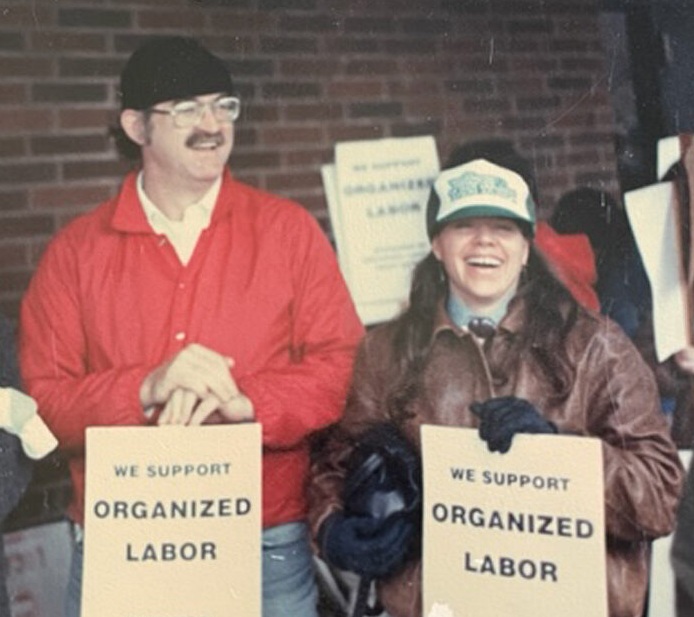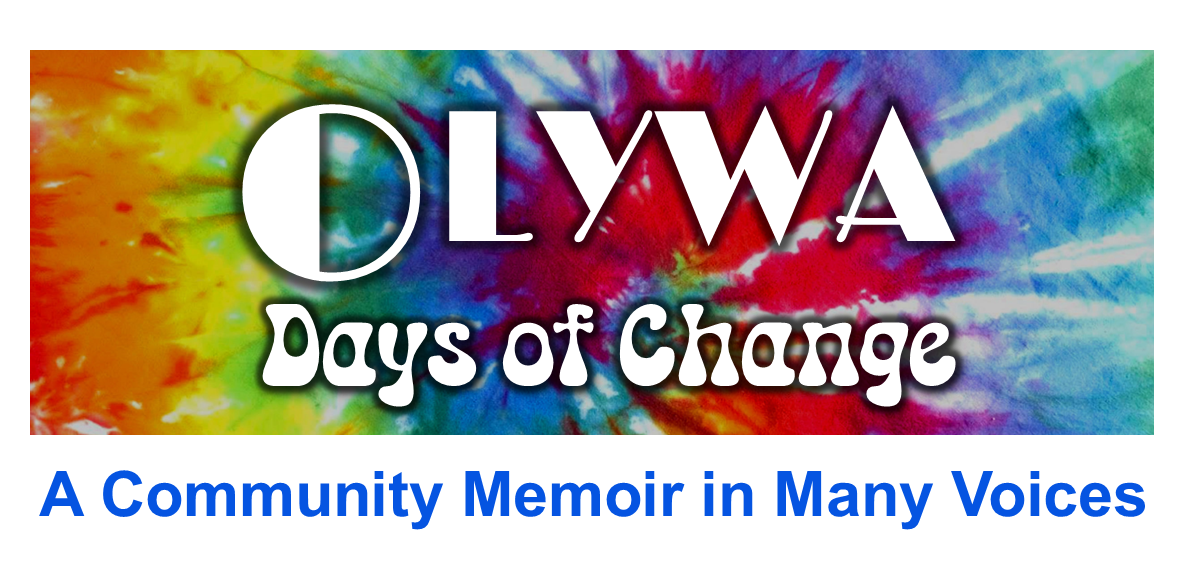ACTIVISM / SCHOOL
Our Experiences at the Evergreen Labor Center
By Helen Lee, Ellen Shortt-Sanchez, and Clark Gilman
We are all longtime Olympia folks and three of many who learned and organized at the Labor Center with Dan Leahy. We did not differentiate between our work at The Evergreen State College Labor Education Center and our working-class roots. We each tell about our involvement with the Labor Center and how it affected our lives. Dan Leahy passed away in 2022. Here is a link to a website that pays tribute to his work.
Helen Lee

From my first days with Dan Leahy, the founding organizer and first director, our working-class roots were the foundation of the early thinking of its vision and mission.
We all had experience with Evergreen as a grand experiment in collective knowledge building and with union organizing. This experience inspired us to imagine melding the two by creating a safe place for working people to discover and promote their agency, their political self-respect, and their dignity with a big dose of building collective power. We hoped that collective power would lead to better working conditions and better pay, and ending racism, homophobia and discrimination. Big lofty ideas for a bunch of Greeners!!! But hey, Evergreen in those days really created the dream of a different world.
I was just one of those Greeners with a twist. I was a third-generation kid from Olympia with big roots in the Pacific Northwest who often bragged that my great grandfather made up the slogan “It’s the Water.” My dad worked at the Olympia Brewery. Also, I was an older student with three kids. I already had plenty of experience as a worker but little experience with unions. When Evergreen workers organized to join the state employees’ union, I was asked to be on the organizing committee as an institutional employee. Thus began a lifelong involvement in the labor movement, including time as a union steward, president of my local union (Washington Federation of State Employees Local 443), president of the Thurston Lewis County Labor Council, and 25 years working as staff for different unions.
Some of the most important work I ever did was at the Labor Center in the early 1980s. It was here, working alongside Dan Leahy, Ellen, and Clark that the real magic happened.
We began our work in earnest putting together a group of women, who were union members from Olympia and the surrounding area, to plan our first Summer School for Union Women. Those early heroes imagined creating a safe space for women to discuss union activity and ways to gain power and autonomy in their unions. Thus began 13 years of women’s schools, building from that early vision. Eventually over 1,500 women attended. It was in this space at Evergreen that union carpenters, machinists, teachers, nurses, and secretaries created strategies for utilizing their unions to change their workplaces and communities toward a more just society. Many of those women have continued their work in our community.

Another union labor and community effort was the creation of a downtown Olympia Labor Day celebration. It was here that the organizers built a strong connection with Olympia’s activist community. We invited organizations who were working on social justice issues to provide tables and information about their efforts. We also had skits, speech contests, puppets, children’s activities, and music. Our best years brought in 1,000 people to this event.
Ellen Shortt-Sanchez
I was a work-study student at Evergreen with the Labor Center and it was the highlight of my learning. With such amazing mentorship from Helen and Dan I had a front row seat when we invited radical labor organizers from the “red scare era” to tell their stories. No one had ever asked them before. I watched teachers organizing across borders in Mexico, US, and Canada. I got to research the dangers of the NAFTA free trade agreement–later we saw it all play out in our region.
The Labor Center hosted an amazing Popular Education Conference in the Longhouse, and we worked to promote literacy in Mason County. From my experiences at the Labor Center I was inspired in a way that carried forward to the work I do now at Evergreen’s Center for Community-Based Learning and Action (CCBLA).
Today CCBLA carries on Farmworker Justice Day in memory of Jose Gomez, labor and civil rights activist who was a faculty member and dean at Evergreen. He is probably best known for his work with Cesar Chavez. The independent farmworker union Familias Unidas por la Justicia joins with Community to Community on campus for the Farmworker Justice Day event. Students hear the story of how the Labor Center sent me to Whatcom County to support planning of the farmworker march in the 1980s and how we have stayed connected ever since.
Clark Gilman
I first experienced the Labor Center as an undergraduate student. At the time I was a carpenter near to completing a 10-year path to a Bachelor’s degree at Evergreen. At my first Labor Center event we were each asked to introduce ourselves using our full names and to tell where our grandparents were from and what kind of work they did. Dan Leahy explained that we were going to hear from every voice in the room, because every voice had something valuable to add. I was excited and in awe.
This was my first taste of recognizing that there is brilliance in every room full of ordinary people, each of us individually might not have the answer to the question, but working together we can figure out what we need to do.
This first experience of feeling included in something bigger than myself was empowering. In the years that followed I worked as project staff for Dan and Helen, then with full-time staff alongside Helen at the Labor Center. We worked with groups of trade unionists, school teachers, state workers, with women, with African-American labor leaders, with Latino immigrants. The work was anchored by the big idea that we create a safe space away from the demands of work and family for working-class people to look at our history, at popular working people’s economics, and hear stories of the organizing successes of other communities.
We spent a lot of time on values clarification, looking at the difference between the priorities and values of a community of working people versus the corporate values that are taught to us and reinforced through the media. We taught groups of people how to make a strategic path for their proposal, both inside union structures and out in the world organizing for social justice.
These lessons stay with me every day. After the Labor Center I helped organize a new local union for residential carpenters. I became a staff organizer, a regional leader, and a national trainer for the Carpenter’s Union. Today I apply lessons from the Labor Center and rely upon the Labor Center community as an Olympia City Council member and a community organizer.
Every successful social movement has a place for folks to think about who they are, what they want for a goal, and how to strategize to make that happen. Just like the civil rights movement, the antiwar movement, the environmental movement, women’s movement, and gay, lesbian, transgender rights movement, we created a space where workers could think about what they could do to change the world to make it a better and safer place for all people.
Visit Evergreen State College archives to hear the full story about our work. Thanks to Helen Lee and Dan Leahy, the archives of the Labor Center at Evergreen are alive and ready to access.
We encourage readers to contact us with comments and corrections. Disclaimer
